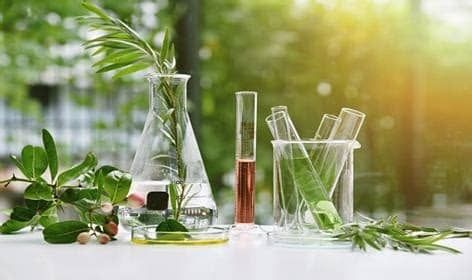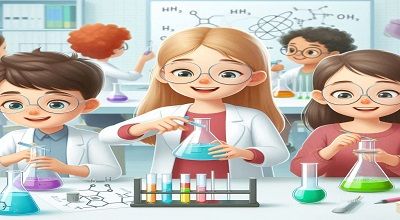Organic Chemistry Lesson Plan
Organic Chemistry Lesson Plan: Organic chemistry is a branch of science focused on carbon-containing compounds. For 11-year-olds, it’s essential to introduce these concepts in a fun and engaging way. This lesson plan aims to provide a basic understanding of organic chemistry through simple explanations, interactive activities, and relatable examples.
Objectives
- Understanding the Basics of Organic Chemistry: Students will learn about carbon, hydrocarbons, and simple organic molecules.
- Identify Common Organic Compounds: Students will recognize everyday substances that are organic compounds.
- Engage in Hands-On Activities: Students will perform simple experiments to observe organic chemistry concepts in action.
Materials Needed
- Molecular model kits
- Simple organic compounds (e.g., ethanol, acetic acid)
- Household items (e.g., vinegar, baking soda)
- Safety goggles
- Disposable gloves
- Notebooks and pencils
Lesson Outline
1. Introduction to Organic Chemistry
Objective: Introduce the concept of organic chemistry and its relevance.
Duration: 15 minutes
Content:
- Definition: Organic chemistry is the study of carbon-containing compounds.
- Importance: Explain how organic chemistry is everywhere in daily life, from the food we eat to the clothes we wear.
Activity:
- Discussion: Ask students to list items they use daily and discuss if they think these items contain organic compounds.
2. Understanding Carbon and Its Bonding
Objective: Learn about the unique properties of carbon and how it bonds with other elements.
Duration: 30 minutes
Content:
- Carbon’s Role: Carbon can form four bonds, making it versatile.
- Bonding: Explain single, double, and triple bonds in simple terms.
Activity:
- Molecular Models: Use model kits to build simple molecules like methane (CH₄) and ethene (C₂H₄).
Visual Aid:
- Draw diagrams of carbon bonds and molecules on the board.
3. Introduction to Hydrocarbons
Objective: Understand hydrocarbons and their classification.
Duration: 30 minutes
Content:
- Definition: Hydrocarbons are organic compounds consisting of only hydrogen and carbon.
- Types: Alkanes, alkenes, and alkynes.
Activity:
- Hydrocarbon Matching Game: Match pictures of common hydrocarbons (like propane or ethylene) with their names.
4. Simple Organic Compounds in Daily Life
Objective: Identify organic compounds found in everyday items.
Duration: 30 minutes
Content:
- Examples: Vinegar (acetic acid), ethanol (alcohol), and citric acid (in citrus fruits).
- Uses: Discuss how these compounds are used in cooking, cleaning, and other applications.
Activity:
- Compound Hunt: Provide students with a list of common organic compounds and have them find items in the classroom or at home that contain these compounds.
5. Hands-On Experiments
Objective: Observe organic chemistry concepts through simple experiments.
Duration: 45 minutes
Content:
- Vinegar and Baking Soda Reaction: Demonstrate an acid-base reaction.
- Simple Distillation: Show how to separate components of a mixture (optional, if resources allow).
Safety Note: Ensure all students wear safety goggles and gloves. Supervise the experiments closely.
Activity:
- Experiment Observations: Have students record their observations and discuss what they learned about the reactions.

6. Review and Discussion
Objective: Review key concepts and address any questions.
Duration: 20 minutes
Content:
- Summary: Recap the main points covered in the lesson.
- Questions: Allow students to ask questions and discuss what they find interesting.
Activity:
- Q&A Session: Use a question-and-answer format to clarify any doubts and reinforce learning.
Homework Assignment
Objective: Reinforce the lesson through independent work.
Task:
- Worksheet: Provide a worksheet with questions about carbon bonding, hydrocarbons, and organic compounds found in daily life.
- Creative Project: Ask students to create a poster about an organic compound of their choice, including its uses and interesting facts.
Evaluation
Objective: Assess student understanding and engagement.
Methods:
- Participation: Observe students during discussions and activities.
- Worksheets: Review the completed worksheets for accuracy and understanding.
- Projects: Evaluate the creative projects based on content and presentation.
FAQs
1. What is organic chemistry?
Organic chemistry is the study of carbon-containing compounds and their properties. It includes the study of hydrocarbons and various organic molecules.
2. Why is carbon so important in organic chemistry?
Carbon is unique because it can form four bonds, allowing it to create a wide variety of compounds. This versatility makes it central to organic chemistry.
3. What are hydrocarbons?
Hydrocarbons are organic compounds made of only hydrogen and carbon. They are classified into alkanes, alkenes, and alkynes based on the type of bonds between carbon atoms.
4. Can you give examples of organic compounds in everyday life?
Yes, common examples include vinegar (acetic acid), ethanol (alcohol), and citric acid (found in citrus fruits). These compounds are used in cooking, cleaning, and other applications.
5. How can we see organic chemistry in action?
Organic chemistry can be observed through everyday reactions and products. For example, the reaction between vinegar and baking soda is an acid-base reaction that illustrates chemical principles.
6. Are the experiments safe for 11-year-olds?
Yes, the experiments included are designed to be safe for young students. Ensure that all safety precautions are followed, such as wearing safety goggles and gloves.
7. How can I help my child learn more about organic chemistry?
Encourage curiosity by exploring everyday items and their chemical properties. Engaging in simple home experiments and discussing the role of organic compounds in daily life can also help reinforce learning.
Conclusion
This lesson plan introduces 11-year-olds to the basics of organic chemistry in an engaging and age-appropriate manner. By incorporating hands-on activities, relatable examples, and interactive discussions, students will gain a foundational understanding of organic chemistry and its relevance to everyday life.
